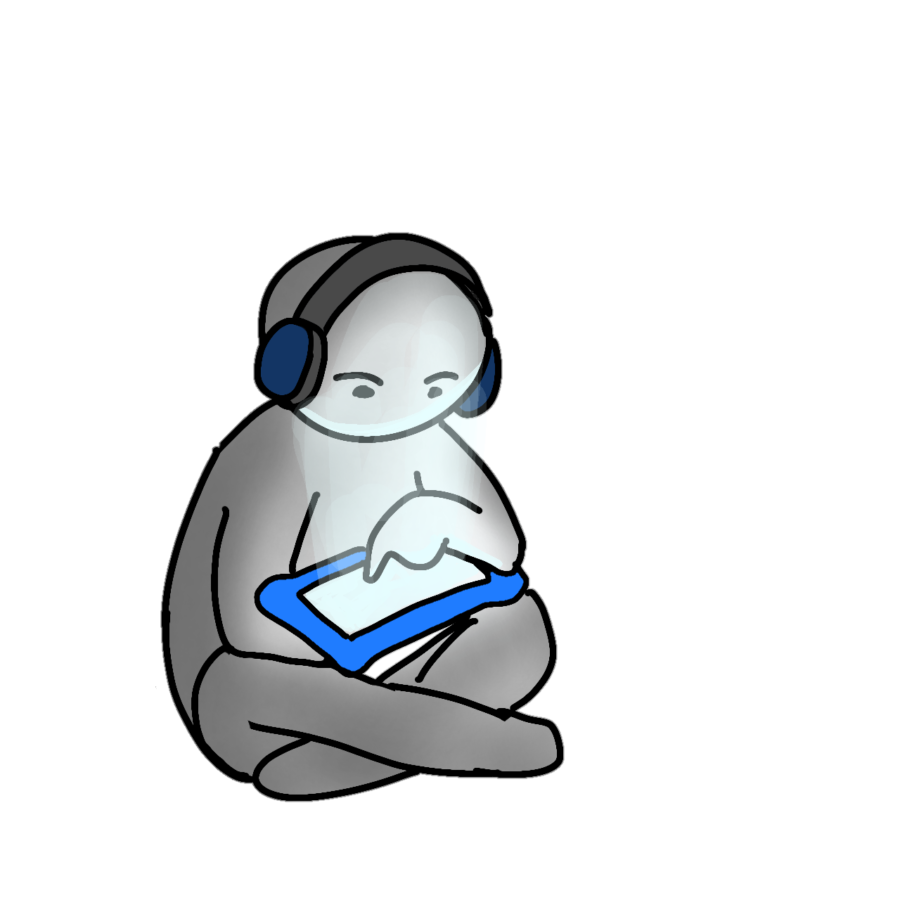Kids these days don’t want to read
Students’ involvement in social media platforms and other online hubs, pose greater risk for a cybersecurity threat. These threats can be prevented with sufficient knowledge over the topic.
March 1, 2022
If you ask an adult what they did during their free time as a child, there is a high chance they will answer with “reading.” They might tell you about the nights they spent curled up in bed with a flashlight and a book, completely engrossed in the story at hand and oblivious to their surroundings. They might mention titles like The Little House On the Prairie and Lord of the Rings, and authors like Dr. Suess and Rohl Dahl.
If you ask a teenager or young adult, they will probably have a similar response. They might mention timely titles like Harry Potter, Amelia Bedelia, Percy Jackson and Geronimo Stilton.
You could try to ask the same question to a young child these days, but they might not answer. They will probably be staring at a tablet or phone, too absorbed to answer you. According to AACAP, in 2020 children ages eight to twelve spent up to six hours a day on a screen, and half of the eight year olds in America had their own devices. As of 2022, children aged two to five spend over two hours on screens a day according to Scripps Pediatrics.
Senior Lulu August has two young siblings, ages four and six. Both of her siblings have their own phones, ipads, and kids smartwatches. “They can’t call or text anyone. They just use it to watch Disney or ABC Mouse. And they play a bunch of educational three-year-old games,” August said.
Although August’s siblings are limited in what they can do on their devices, they still spend around three hours a day using them. Children today have more access to technology than ever, and therefore accumulate a lot of screen time.
Technology has nearly replaced books as a method of entertainment for kids. Young children can often be found sitting in strollers or in the car playing games on a tablet. Screens have assumed the function of babysitters or pacifiers, used to keep kids quiet or stop tantrums.
All of this screen time for kids means less time for reading. In 2019, the National Literacy test found that only 53% of children say they enjoy reading for fun, a lower percentage than in previous years. Sixteen percent said they never read for fun. Children today would much rather watch videos on their tablet than read a book.
This was not a problem in the past. Much of the technology that children today are addicted to did not exist just a few decades ago. Typewriters were used up until the 90s. Flip phones were used through the early 2010s. “I didn’t even know about having a computer that you could use and carry around until I was in college. And they were these big clunky weird things,” English teacher Stephanie Halloran said.
For Ms. Halloran’s generation, most of children’s screen time came from watching cartoons and rom-coms on TV. “Every day I would watch reruns between school and dinner,” Ms. Halloran said.
US history and government teacher Nathaniel Mason had a little more access to technology as a kid. “I was in high school when I got my first phone and in high school when I built my computer,” Mr. Mason said. “I circumnavigated the parental controls on it so I could play games.”
Still, the entertainment of Instagram and TikTok did not exist a decade ago. So, children used to read to pass the time. “I read every day, as much as I could,” Ms. Halloran said. She spent multiple hours a day in front of a book, reaping the many benefits of reading.
Reading is especially important for young kids. “Reading a book is more of an active brain experience. Your brain has to make the connections, it has to form meanings out of the words on the page, it has to visualize what’s happening,” Mr. Mason said.
Reading also allows young kids to be transported to worlds and cultures they would otherwise not experience. It teaches them to empathize with characters who are very different from them.
Most current high schoolers were also able to experience the joys of reading as children. They grew up in the time right before the explosion of smartphones and ipads, and for the most part did not have as much access to those devices as young children.
As children, many high school students spent hours reading each day. “It was my favorite hobby,” August said. Unfortunately, many people who loved reading as kids find themselves unable to read as often as they used to.
“I just don’t have the time,” is the common excuse. In reality, it is not that people do not have the time to read, but that they don’t prioritize it. “I don’t make enough time, like I spend the time binge watching Netflix,” August said. “I also feel more of a pressure to read things that I’ll learn from, rather than things I’ll just enjoy.”
With the rise of the Internet in the past two decades, reading for education has become much more popular. “I don’t really read books anymore. I read stuff on the internet if I want to learn something,” sophomore Hugh Hagen said.
Reading online has also become more popular. Although this is still technically reading, it adds to screen time.
Of course there are, and always have been, children who strongly dislike reading. “There were people that bragged about how little they read. It’s pathetic and sad,” Mr. Mason said.
Still, many more of today’s children refuse to read anything out of their own free will. This is due to the rise of technology access in children.
Many high school students who have younger siblings can attest to the fact that children today are getting devices younger and younger. Even within a family, this change is apparent.
Hagen got his first phone in seventh grade. However, his 11 year-old brother got access to technology even earlier. “He got a Kindle Fire when he was in second grade,” Hagen said. “He has my dad’s old phone, and he’s pretty much made the family computer his own.”
However, his brother’s use of technology has impacted his relationship with books. “Over the summer my mom made him read,” Hagen said. “I don’t think he really enjoyed it.”
This lack of reading causes problems in the classroom. Without the academic skills developed by routine reading, children have a harder time comprehending the material they are assigned. In fact, a 2018 NIH study found that kids who spend more than two hours a day on screens got lower scores on language and thinking tests.
Excessive use of technology hurts students in other ways too. “If you’re watching TV, or like doom scrolling on social media, your brain isn’t doing anything, it’s just kind of sitting there, apathetically receiving information,” Mr. Mason said.
Teachers have noticed a change in attention spans as a result of cell phone usage. “It’s very hard for students to sit and read for longer than five or 10 minutes,” Ms. Halloran said.
According to the Epigram, reliance on technology has decreased attention spans by up to twelve minutes. This is because of the instant gratification of tech and social media.
The videos teens watch on TikTok are less than a minute long, a reflection of how short attention spans are. Teens scroll through the videos, watching just a few seconds to get an idea of the video and then immediately swiping up because it was not interesting enough. Things move so quickly that if a video cannot hook the viewer in the first three seconds, it’s practically useless.
We also have become incredibly impatient when it comes to our technology. Improvements in technology means that devices and webpages load almost instantly, and we get annoyed when it takes longer than this. High school students seem to have forgotten how long they used to wait for the Dell computers in their elementary school media center to load.
The instant gratification of tech today means students have a harder time focusing on long-term tasks. It has also led to phone addiction, which can become a problem in school.
Students have a harder time putting away their phones during class. “If they are not immediately entertained, they will pull out their phone and stare into the rectangle,” Mr. Mason said.
Ms. Halloran also saw a problem with how students interact with texts in their virtual form versus in print. “It’s a different thing to have a physical book, and to recognize that this is somebody’s work. You can’t change it,” she said. “[Online], we do collaboration, we change each other’s work. And we don’t necessarily think ‘this is a fixed piece of text that somebody produced that they own.’”
Despite the numerous downsides of technology usage with young kids, there is also a positive side to it. “It connects them with their peers in ways that were not possible,” Mr. Mason said. “It gets you access to literally everything ever printed, the entirety of human history.”
Exposure to technology at a young age also teaches kids to be savvy with tech. “My sister got a Chromebook this year in kindergarten and she’s getting better at using it than I am honestly,” August said. “It’ll just help her in the future because that’s where the world is headed.”
On average, teens spend more than nine hours a day on screens. “It’s more hours of the day than not. At school we’re looking at screens, and all my homework is on my computer. Everything I do is basically on a device,” August said.
Teens are on screens all day, from looking at their phone when they get ready for school to using computers and prometheans during class, doing homework on their laptop, watching tv or playing video games and looking at their phone before they go to bed.
Technology usage is not going to decrease any time soon. As the world accelerates its transition to an online format, children will continue to grow up on screens instead of books.
As for whether the benefits of technology outweigh the drawbacks, there is no clear answer. “I think it’s all about moderation,” August said.



